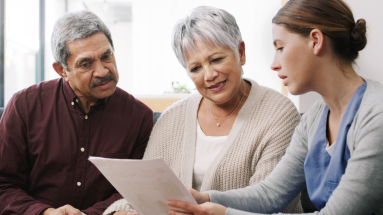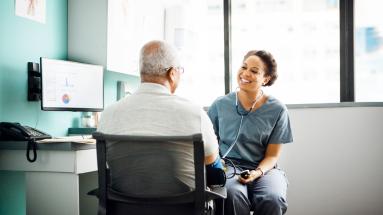How to be a smart e-health consumer
How to be a smart e-health consumer

By Shelley Levitt
Would you believe that approximately two out of three adults who are 65 and older are active on the internet? According to a 2017 Pew Research Center report, it’s not only true, but that’s a huge jump from 2000 when only 12% of seniors reported being internet users.
What’s sometimes referred to as “e-health” is one area where the web may have an especially positive impact on senior web surfers. Loosely defined, e-health, short for electronic health, can refer to everything from connecting with your healthcare providers online to researching health conditions or using social media platforms to find support when you’re dealing with a health challenge.
“The internet—when information is reliable and medically accurate—is a wonderful way for seniors to become informed about their specific health concerns and to be become active, engaged members of their healthcare team,” says Nicole Rochester, MD, a Maryland physician who founded a healthcare advocacy company to help seniors navigate the healthcare system. “Online resources are no substitute for medical care,” Dr Rochester says, “but they can provide a valuable adjunct to that care.”
Here are three strategies for becoming a savvy e-health consumer:
Learn to recognize reliable, unbiased health websites
Many medical centers and hospitals have digital health libraries that contain extensive information on general wellness and specific health concerns. Some may also include helpful interactive tools and videos on topics like what to expect during a colonoscopy, eating well with diabetes or the best way to get out of bed when you have back pain.
Other trustworthy websites are those run by the government, such as the National Institute on Aging or the Centers for Disease Control and Prevention. A government-sponsored website will have a web address that ends in “.gov,” while a website run by an educational institute will end in “.edu.” You can find more tips on how to assess the reliability of a health website by visiting the National Institutes of Health’s Finding and Evaluating Online Resources.
Become part of a digital support community
Online support groups can be a great way to connect with a community of people who are dealing with similar health issues. Many nonprofit health organizations, including the American Cancer Society, have online support groups that may include chat rooms, podcasts or “ask the expert” online forums.
Share your journey on your terms
When you’re dealing with a health challenge, repeating the story of your diagnosis and ongoing updates to concerned friends and family can sometimes feel like a burden. Modern-day solutions are to create a website, give updates on social media or download an app where you can post news and ask for help. There are several options. One example is LivingWith®, a free app, developed by Pfizer Oncology, designed to help manage life with cancer. LivingWith can help you connect with loved ones, ask for the support you need, remember important information from doctors’ visits and stay organized, all in one place. You can also update friends and family or assign a proxy to update them on your behalf. Learn more about LivingWith here.
The information contained within this article is based upon the knowledge and opinions of the author and experts.













